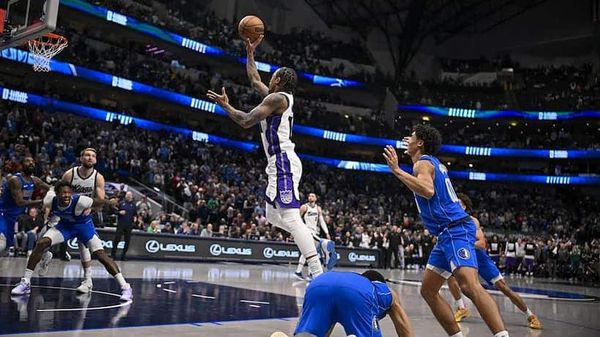There's one moment early in Steve Waugh's innings at Headingley in June, 1989, that foreshadows what is to come for England's bowlers.
Phillip DeFreitas comes bustling in to bowl, body bursting in every direction as he hits the crease, and sends down a perfectly respectable ball outside off stump.
Waugh leans forward and punches the ball through the covers and briefly holds the pose. He doesn't bother to run as the ball races to the boundary and a wave of applause begins. It's a shot played with total confidence, despite the overcast skies.
On commentary, Richie Benaud sums it up perfectly, after a short pause to let the crowd noise abate.
"That's a delightful stroke" he croons.
"I'd swear that was nothing more than a defensive push."
More than 20 boundaries later and Waugh was still batting, guiding Australia to 7 for 601 declared and scoring 177 not out in the process.
Finally, after a 26-Test career where he had shown plenty of promise with the white ball but never really proven himself in the longer format, he'd hit his first Test hundred.
Some 30 years later, Waugh describes it as one of the "proudest moments" of his 168-Test career.
"It's like you've graduated as a Test cricketer by doing that," he says.
'A breakthrough for the team'
Waugh's century, plus some fast scoring from Dean Jones and captain Allan Border on the final morning of the match, ended up pushing Australia to an unlikely win in that first Test.
"We were basically playing not to lose it," Waugh says.
"We only declared just before lunch on the last day and Allan did that to make sure we couldn't lose the Test."
But the tourists grabbed a wicket just before the break and they soon realised a win was possible as more wickets started to fall.
"You could actually feel us growing as a team and starting to believe in that middle session, it just sort of happened," he says.
Waugh remembers the team celebrating after the match for hours, drinking and singing the team song in the change rooms.
"It was like it was a breakthrough for the team," he says.
"We achieved something we didn't think we could do and all of a sudden we're thinking, 'Hang on, maybe we're not such a bad side after all'."
A tour for the ages
That 210-run win in the first Test of Australia's 1989 Ashes tour was indeed the start of a spectacular run for the tourists.
They ended up winning the series 4-nil, the first time that Australia had won the famous urn in England since 1975.
Waugh crashed countless back foot cover drives to the fence that English summer, scoring another century in the second Test and managing 393 runs before England could get him out.
Batting at number six, he compiled 506 runs at an average of 126.50 across the tour.
Only Mark Taylor and Dean Jones, batting above him in the order, scored more, managing 839 and 566 runs respectively.
"We just got on a roll, it was like a snowball effect," Waugh says.
"By the end of the tour, we just thought we could beat anyone.
"We came together, we grew and the team created its identity on that tour."
As well as some superb batting, Australia's bowling was relentless.
Written off before the series started for being too old, Terry Alderman took 41 wickets for the tour (including 19 LBWs). He was well assisted by Geoff Lawson with 29 wickets and Merv Hughes who took 19.
The late Dean Jones summed it up best in his autobiography Deano: My Call, when he wrote "everybody on that tour contributed."
Not all plain sailing
Not long after the highs of that breakthrough tour, Waugh was dropped from the Australian side in the middle of the 1990/91 home Ashes series, after a dip in performance.
"I don't know what happened. I think there was just a lot happening in those years," he says.
"I was successful, but maybe I took the foot off the accelerator, my form slid a bit and my brother Mark obviously replaced me.
"He came in and scored that century in Adelaide and said to the selectors, 'Why didn't you pick me earlier?'"
Some 18 months later, when Waugh did claw his way back into the Test side, his batting was less flashy and more calculated. It eventually paid dividends, as he went on to become the number one ranked batsman in the world and a highly successful captain.
Waugh guided Australia to the equal highest winning streak in Test history (16 matches) between October 1999 and February 2001.
At the ripe old age of 36, he finally got the chance to captain his country in England, a series Australia won 4-1.
He averaged more than 100 with the bat once more and his 157 not out in the final Test at The Oval came just weeks after a calf injury, in what was an incredible act of physical endurance.
A 'special' day at the SCG
Waugh would write one more Ashes highlight into the history books before ending his career: his famous last ball hundred in front of his home crowd, in 2003.
A thrashed square drive off English spinner Richard Dawson in long shadows at the SCG brought up his 29th Test ton, to equal Don Bradman's tally. It also came on the same day as he passed the 10,000 Test runs mark.
It's a thrilling moment included in almost every recent Ashes highlight reel, but it was also significant for Waugh who, in the twilight of his career, was battling to score runs.
"You start to even doubt yourself, even though you think you can do it," he says.
"Maybe you are past it, maybe you can't do it again.
"To pull that out of the fire; it was a relief, but it was also special."
When asked to compare it to his first Test ton, to kick-start Australia's 4-nil drubbing of England on foreign shores 13 years earlier, Waugh says that the experiences were memorable for different reasons.
"1989 was really all about the team, and coming together and achieving something as a team," he says.
"The last-ball century was about me proving to myself that I was still good enough."







